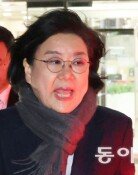Failed real estate policies are Moon’s worst failure, say ruling party candidates
Failed real estate policies are Moon’s worst failure, say ruling party candidates
Posted July. 03, 2021 07:14,
Updated July. 03, 2021 07:14
Preliminary candidates of the ruling Democratic Party of Korea’s presidential primary race agreed that the biggest failure of the Moon Jae-in administration is real estate policy. They pointed out in an event titled “Press Day” to answer to press members on Thursday that a series of failed real estate policies drove house prices up.
Former Justice Minister Choo Mi-ae said that the worst policy is real estate measures. Former Prime Minister Chung Sye-kyun expressed some remorse for house market initiatives. Lawmaker Park Yong-jin attributed the failed real estate market to former chief of staff for policy Kim Soo-hyun and former Minister of Land, Infrastructure and Transport Kim Hyun-mi, saying, “Housing supplies are lacking in the market. The two officials did not listen to anyone else. It comes as no surprise that all the preliminary candidates see real estate policies as the No. 1 failure. Gangwon Province Governor Choi Moon-soon criticized that the government only focuses on regulation. Gyeonggi Province Governor Lee Jae-myung said in a separate meeting on Friday, “I am not in a position where I can be critical enough as if I were not any part of it,” while expressing doubt that the government has done its best.
The ruling party formed an internal special committee on the real estate market to make up for the failed house policies after its lopsided loss in the April 7 by-elections. The committee proposed a new policy of allowing anyone to own his or her house merely by paying 10 percent of a house price. However, it ran against how the market works because of its lack in incentives for developers. As for comprehensive real estate tax, it devised a policy to set a percentage (upper two percent) to decide who pays it not based on appraised value of land, coming under criticism for proposing such an oddly designed policy. Added to this, it increased transfer tax for elderly citizens living in the same house for 30 to 40 years by reducing benefits for special deduction for long-term holding.
Meanwhile, preliminary candidates were busy showing their real estate policy directions in mind. Choo on Thursday implied a stronger public concept of land ownership, explaining that the culprit behind inequalities and economic disparities is monopoly of land that enables unearned income. Lee said, “I consider it a solution to increase taxes further and make it hard to transact houses so that unearned income cannot come out of acquisition, holding and transfer of a house.” All they say is that the Moon administration has failed at the house market. However, it is suspicious that they may repeat the same mistake.
The ruling party’s preliminary candidates are not supposed to point an accusatory finger at the failed policy in the house market but should be held accountable because they have led legislative actions regarding real estate bills as part of the majority of the National Assembly. The house market is still suffering. They should feel a burden of responsibility on their shoulders and provide an objective diagnosis and measures based on the principles of the market economy.





![“한동훈, 정치생명 걸고 무소속 출마해 평가받는 것 고려할만”[정치를 부탁해]](https://dimg.donga.com/c/138/175/90/1/wps/NEWS/IMAGE/2026/01/19/133186982.1.jpg)

